One of the strengths of alternative accommodations in Europe is their diversity. Each country has its own innovative approaches, shaped by cultural heritage, environmental priorities, and policy frameworks. The Epic Stays project highlights these distinct approaches and supports best practices through shared knowledge and collaboration.
Country-Specific Innovations in Alternative Accommodations
Spain: Sustainable Rural Tourism and Agrotourism
Spain has championed agrotourism, with government incentives supporting rural farm stays, vineyard retreats, and eco-lodges.
- Innovative Approach: The Spanish government supports rural tourism networks like “Ceres Ecotur,” which promotes eco-conscious farm stays.
- Development Path: National grants fund sustainable refurbishments and rural business development.
- Support Received: The EU’s LEADER program funds projects revitalising rural areas through sustainable tourism.


Source Smart Rural Tourism Experience Design
Italy: Heritage Accommodations and Alberghi Diffusi
Italy Revives Abandoned Villages as Experiential Travel Destinations
Italy’s “Alberghi Diffusi” (scattered hotels) concept allows visitors to stay in revitalised historic villages.
- Innovative Approach: Repurposing abandoned village homes into decentralised accommodations.
- Development Path: National policies encourage local entrepreneurs to restore heritage buildings.
- Support Received: EU Regional Development Funds assist in restoration projects and infrastructure improvements.
https://skift.com/2019/11/26/italy-revives-abandoned-villages-as-experiential-travel-destinations/
Italys Alberthi Diffusi
Alberghi diffusi, the literal translation of which is widespread hotels (or scattered hotels), represents a unique model that redevelops abandoned buildings in small villages with an eye to hosting tourists. Instead of being in one vertical building, these lodgings are distributed horizontally among various restored buildings around the settlement, integrating guests within the community. At least one of those buildings houses a central reception and common space. Typical hotel services, like housekeeping and room service, are provided under the realm of a single manager.
Albergo Diffuso Comeglians, located in the northeastern region of Friuli-Venezia Giulia, consists of rooms in former farms and stone barns, while the reception area is in an old dairy. In Matera, Sextantio Le Grotte Della Civita has inserted accommodations inside Sassi, the cave dwellings that sheltered locals until the Italian government moved residents out in the 1950s. Its 18 bedrooms are set in furnished, candlelit caves.
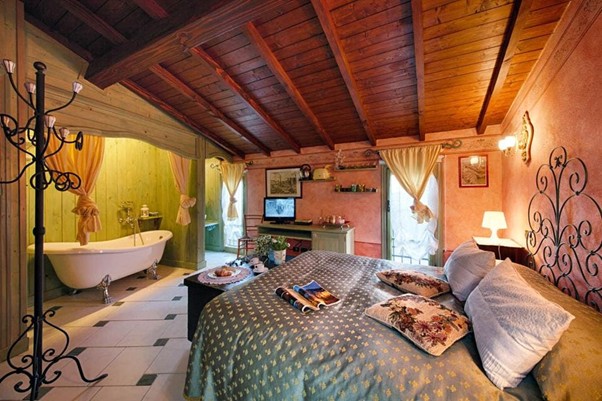
Located in Apricale, Liguria, the Albergo Diffuso Muntaecara means “Up and down” in the local
This type of accommodation offers all the inimitable warmth and charm of Italian hospitality, together with the quality control of a traditional hotel. Each albergo diffuso has dedicated common areas for guests, including a check-in lobby and a breakfast dining room. “The living room is the piazza,” says Dall’Ara.

The concept may seem similar to an agriturismo (farm stay) or a bed & breakfast, but the intent behind an albergo diffuso differs. “We want to create a community among locals and visitors. The hotel is an integral part of a virtuous network promoting an economic and social revival outside Italy’s cosmopolitan centers,” explains Dall’Ara.
“It is a driving force of sustainable development for a small town, for a region and for our country.” If the idea of a scattered hotel is to give a local experience, then local life must be defended and preserved.
Decades after the earthquake in Friuli, the albergo diffuso still feels like the new frontier of hospitality—one that is poised to expand in a post-COVID-19 world.

There are over 140 alberghi diffusi in Italy, each reflecting the diversity of Italy’s heritage. In Puglia, you can sleep in a conical-shaped Trullo in the enchanting town of Alberobello, while near Rome, you can sleep in a medieval castle. One of the leading proponents of the hotel model is the Sextantio brand, which operates two alberghi diffusi in Italy. The first property revived the formerly abandoned village of Santo Stefano di Sessanio in the mountainous Abruzzo region. In contrast, the second accommodation features evocative cave dwellings tucked within the Sassi di Matera.

The Sextantio Le Grotte Della Civita is one of Italy’s most evocative cave hotels. Mandalyn Renée
In this moment of global upheaval, when many of us are searching for ways to live more sustainably and travel more meaningfully, the model has broad appeal. 90% of Italy’s alberghi diffusi stay open 12 months a year — an occupancy rate most traditional hotels struggle to meet.
Last summer, despite the pandemic, travelers flocked to Italy’s small villages to stay in scattered hotels. Located off-the-beaten-path, the properties are immersed in nature, which guarantees social distancing, but Dall’Ara believes travelers were motivated by more than just their safety.

Some alberghi diffusi are set on hilltop towns within Italy’s castles, like the Castello di Proceno. Castello Di Proceno
“The pandemic has made us reflect on the fragility of our lives and our land,” he says. “By seeking out alberghi diffusi, travelers demonstrated a desire to support small businesses and villages that represent a real value in our society.”
The hotel model promises a high-touch experience centered around shared values.
“When you are hosted in an albergo diffuso, you’re not just buying into an exchange of services. You’re entering into a human relationship,” explains Dall’Ara.
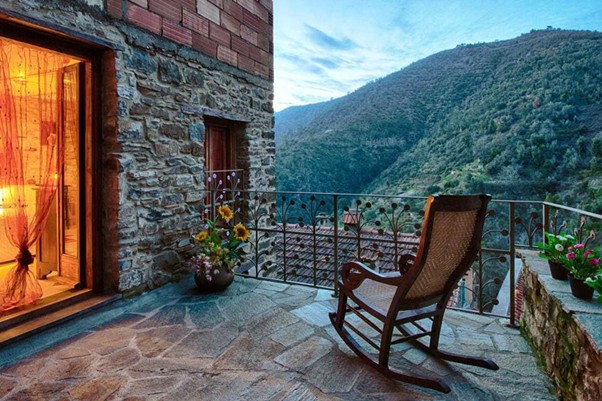
The Albergo Diffuso Muntaecara features rooms and suites nestled within ancient towers and stone.
Source Forbes
Corippo, Italy New Albergo Diffuso
Corippo’s new albergo diffuso consists of ten cozy rooms spanning five restored residences. Adjacent to the main piazza is a terraced osteria (restaurant) with sweeping canyon views that doubles as a lobby. Distinctive architectural details, such as original exteriors and dimensions, were preserved using local materials.
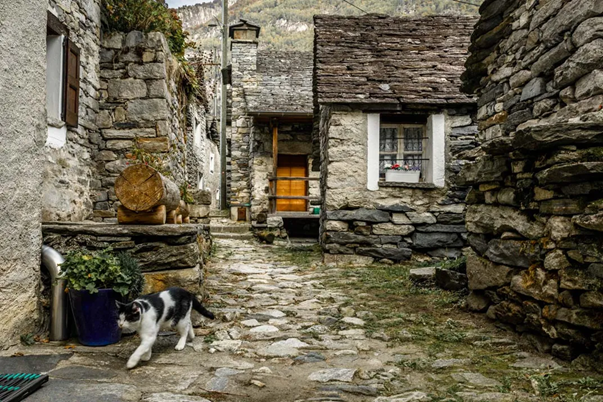
Beyond Corippo’s historical significance and ideal landscape for outdoor activities, its appeal is its sense of solitude. Locarno’s promenade of boutiques and cafes and Lugano’s art museums and galleries are less than an hour away, but the hamlet is peaceful.
Switzerland Albergo Diffuso Style Accommodation
New to Switzerland, the albergo diffuso accommodation style originated in Italy, inspiring offshoots throughout Europe. Giancarlo Dall’Ara is president of the Alberghi Diffusi National Association and the concept’s mastermind.
“Albergo diffuso is an Italian hospitality model that is 50 percent hotel and 50 percent small-village development,” the Rimini native explains.
The approach restores a network of abandoned dwellings as guest accommodations, providing the immersive cultural experience of a bed and breakfast combined with the reliability, quality, and services of a modern hotel. Alleyways become metaphorical hallways, and piazzas become living rooms.
“Nature and the landscape were the most important attractions,” says Dall’Ara. He first considered agriturismo, often called “farm stays,” which are privately owned properties offering beautiful views, local fare, and hands-on experiences showcasing how and what the farm produces. But it was António Ferro’s pousadas of Portugal that intrigued him most.
That means hotels calling themselves albergo diffuso may not adhere to Dall’Ara’s criteria. According to the International Alberghi Diffusi Association, only 150 are certified. For Dall’Ara, the critical characteristic of a “true” albergo diffuso is the combination of accommodation and small-town development. For this reason, many Alberghi diffusi work in concert with government programs or preservation initiatives.
Germany Albergo Diffuso Style Accommodation
In recent years, countries around the world have introduced alberghi diffusi. In 2015, Yakage-ya Inn and Suites debuted in Yakage, in Japan’s Okayama prefecture, a common stopover point for feudal lords and their coterie along Sanyo Road in the Edo period (1603-1868). The inn features several restored structures of a private residence that is more than 200 years old. Germany’s Franconia wine district welcomed Albergo Diffuso Mainbernheim in 2020. Behind the town of Mainbernheim’s medieval walls, rooms occupy a 1900s farmhouse, a 1500s historic inn, a 1400s abode of a military governor and a 1700s home of a wine merchant.

Source Smitsonian Magazine
Germany: Smart and Digitalized Accommodations
Germany leads in smart tourism, integrating AI-powered booking systems, digital keyless entry, and energy-efficient accommodations.
- Innovative Approach: Digital tourism experiences include AI-powered recommendations and virtual concierge services.
- Development Path: The government promotes smart city initiatives that extend to tourism.
- Support Received: The German Federal Tourism Strategy provides funding for digital transformation in accommodations.
France: Eco-Lodges and Sustainable Tourism Initiatives
France has seen a rise in off-grid, eco-friendly lodges, from yurts to treehouses.
- Innovative Approach: The government supports certifications like “Green Key” for sustainable tourism businesses.
- Development Path: Strong regulations ensure accommodations meet environmental criteria.
- Support Received: The French Sustainable Tourism Plan provides funding and training for green tourism initiatives.
Here are some examples;
Casa Sallusti
Combining Alternative Accommodation with Chic and Agrotourism
Casa Sallusti (Provence Alpes Côte d’Azur): Are you a fan of glamping combined with chic and authentic agrotourism? Casa Sallusti is a farm hotel situated on the heights of Nice with a magnificent view of Vence’s typical village. Here, you can stay in three lodges or a chalet. These four accommodations are located on a 13,000 m2 site. Isabel will be happy to explain everything about the permaculture vegetable garden. On site, you can also enjoy a natural swimming pool or, if you wish, according to the schedule, have cooking lessons or yoga sessions.
Isabelle opens the doors of her farm and her permaculture vegetable garden, all with a view of the bay of Nice.

https://ethik-and-trips.com/en/hebergement/en-france/casa-sallusti-2
AU 46
Combining Alternative Accommodation with a Vegan and Organic Breakfast
Au 46 (Brittany): This guest house, renovated with heart and taste by Carole and Pierre, opened its doors in June 2020. It is now a charming bed and breakfast in Finistère. You will be warmly welcomed by the hosts, who are very committed to the environment and the preservation of nature. Between the furniture made in France, the natural cosmetics and the delicious vegetal table d’host made with products from the vegetable garden, you are guaranteed to spend a vacation fully oriented towards sustainable tourism.
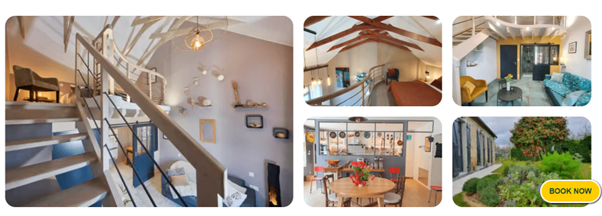
https://ethik-and-trips.com/en/hebergement/en-france/au-46-2
Le Logis des Felurs and le Dodecadome
Combining Alternative Accommodation with Bio Climate Architecture and Well-being
The Logis des Fleurs is a lodge for groups, and the Dodécadôme is a room reserved for activities. These ecological buildings with bio-climatic architecture are nestled in the heart of the Biovallée, in Drôme, between Vercors and Provence. Visitors are kindly welcomed in Baume Rousse, a hamlet sculpted by more than 30 years of bio-dynamism, surrounded by good energies and the opportunity to reconnect with nature—plenty of well-being activities, vegetarian and traditional meals, local products and culture.
https://ethik-and-trips.com/en/hebergement/en-france/le-logis-des-fleurs-et-le-dodecadome-2
Les Terres des Baronnies
Combining Alternative Accommodation with Nature, Sports and Heritage
Located in the heart of the Regional Natural Park of the Baronnies Provençales, welcome to the place where the mountains meet Provence. Your hosts, Aline and Bruno, will make your stay between Vercors, Drôme and Lubéron an unforgettable experience. It will start with a delicious meal at the table d’hôtes with Provencal flavors. Then, join your bed in one of the cabins of this unusual accommodation in the Hautes-Alpes. Reinvigorated, set off to discover the surroundings of Terre des Baronnies, between nature, sport and heritage.
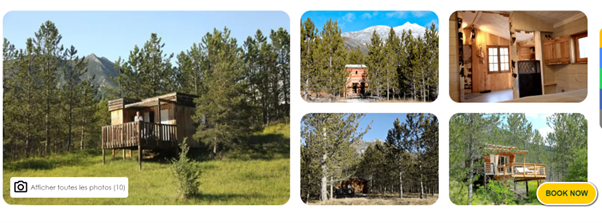
https://ethik-and-trips.com/en/hebergement/en-france/terre-des-baronnies-2
The Epic Stays Contribution to European Alternative Tourism
Epic Stays facilitates cross-border learning, ensuring that best practices from each country can be shared and implemented across Europe. The project aligns with EU objectives to enhance alternative accommodations through:
- Training and Education: Equipping SMEs with knowledge on sustainability, heritage tourism, and digital transformation.
- Networking and Collaboration: Creating a pan-European community of alternative accommodation providers.
- Quality and Standards Development: Promoting consistency in alternative tourism while celebrating national uniqueness.
“Diversity is the strength of European tourism. By learning from each other, we create a more sustainable and immersive travel experience.” – European Travel Commission.
Conclusion: A Collective Path to Tourism Excellence Each European country offers a distinct alternative tourism experience, shaped by cultural traditions, policy frameworks, and regional priorities. Epic Stays ensures that these unique approaches contribute to a high-quality, innovative, and sustainable European tourism sector.
Laura Magan,
European Projects Specialist in Tourism,
Momentum,
Ireland
https://momentumconsulting.ie/